RE Open Data InitiativeRequirements Engineering 2025
Practitioners have limited evidence of the effectiveness of RE research techniques, as these are seldom applied to real-world, contextualized data. At the same time, researchers face challenges in accessing and sharing industrial requirements-related data, due to confidentiality concerns of the data owners. The RE Open Data Initiative aims to collect industry requirements data that will become accessible for researchers through a provided infrastructure. Researchers can then use these data to conduct research on challenges and datasets that are declared meaningful by practitioners. Submissions that make use of these data are welcome and encouraged in all tracks of RE’25.
The infrastructure supporting the RE open data data initiative is intended as a long-term setup; data stored in there will be accessible beyond the current instance of the RE conference.
Call for Data
The RE Open Data Initiative aims to bridge the gap between research and industry by making industry requirements data accessible for researchers in a dedicated infrastructure. Practitioners and researchers are invited to provide requirements-related data sets for public use. Authors shall submit data sets in accessible formats like ReqIF (https://www.omg.org/reqif/), CSV, PNG, JPEG, GIF, PDF, XML (preferably with XSD schemas), database exports, open standards for word processing software and spreadsheets. We welcome all kinds of requirements formats and requirements related artifacts, including but not limited to:
-
Natural language requirements extracted from requirements management systems or contracts.
-
Epics, user stories, and acceptance criteria.
-
Process models, UML models, feature diagrams.
-
Use case specifications.
-
Change requests obtained from, e.g., issue tracking systems.
-
Any kind of early requirements, including user feedback, transcripts, and recordings.
-
User and stakeholder maps that describe stakeholders and their relationships.
-
Specification documents.
-
Trace-links and traced artifacts (e.g., requirements-to-code, requirements-to-architecture, requirements-to-tests).
Notes:
-
All data are welcome, including labelled/annotated data that can be used as a ground truth.
-
We also accept submissions of data already published elsewhere, for inclusion in the RE data track infrastructure. Specific instructions will be provided.
Additionally, use case and background information are welcome to support the business and software development context understanding. This optional material, which should be submitted in PDF format, includes but is not limited to:
-
Business segment/domain introduction.
-
Application scenarios describing how the data are intended to be used.
-
Challenges experienced by practitioners in using these requirement artifacts.
Data privacy and legal compliance
All accepted data sets will be made publicly available. This requires approval from the data owner for publication.
Submissions must comply with local and regional regulations.
Submissions must comply with local and regional data privacy regulations, such as GDPR. At a minimum, compliance with local regulations at the data’s origin is required.
The submitting author is responsible for compliance with legal requirements.
An open license shall be specified that permits potential researchers to make use of the data for (at least) non-commercial purposes. The submitting author is required to declare explicitly their preferred license. Help with choosing a license can be found here: https://ufal.github.io/public-license-selector/
Visibility of the data-owning company
The data owning party can choose between an anonymous or attributed publication of their data. If required by company or local regulations, a consent form for publication may have to be signed, where the data owning party is visible for the data initiative chairs.
Anonymization of Data
We recommend anonymizing or, pseudonymizing data as well as avoiding sensitive data whenever possible, particularly stakeholders and usernames, information related to unique selling points, or company secrets.
If available, domain market reports can provide insights of frequently offered features in a domain. Providing data around frequently offered features reduces the risk of touching company secrets.
Data sharing and infrastructure
The RE Open Data Initiative aims at collecting RE datasets in a single, open, persistent infrastructure that can be accessed by researchers and practitioners. To this extent, we have decided to rely on a “Community” on Zenodo. The community is called “RE Open Data Initiative” and can be found at the following URL: https://zenodo.org/communities/re-data/
Specific details on how to submit data can be found here: https://conf.researchr.org/track/RE-2025/RE-2025-re-open-data-initiative#Submission-Instructions
For any additional details about submitting and publishing the data, we encourage reaching out to the RE open data initiative chairs at re-open-data-initiative@googlegroups.com. We also welcome the whole RE community to think along and provide recommendations.
Submission Instructions
The RE Open Data Initiative aims at collecting RE datasets in a single, open, persistent infrastructure that can be accessed by researchers and practitioners. To this extent, we have decided to rely on a “Community” on Zenodo. The community is called “RE Open Data Initiative” and can be found at the following URL: https://zenodo.org/communities/re-data/.
What should be submitted?
- [mandatory] a requirements-related data set for public use, provided in an accessible format (see the call for data).
- [optional] use cases and background information that support understanding the business and software development context, in PDF format.
How to submit?
We support four typical scenarios that we describe in the following. For industry practitioners who are willing to share their data, Scenario 1 is the typical case and we recommend following the suggested process, which provides you with help from the RE Data Initiative chairs in preparing and sharing your data.
Scenario 1: New data set that is not public yet
Do you have company-owned requirements-relevant data that you would like to share with researchers? Do you want to set a challenge for them?
In this case, prior to submitting the data to the Zenodo community, we encourage you to first sharing your data with the track chairs. Send an e-mail to the chairs indicating your intention to share data. You can either share a link to the data, or just initiate a discussion with the track chairs. E-mail address: re-open-data-initiative@googlegroups.com
The track chairs can help with tips and explanations regarding licensing, anonymization, formatting, and with any other kinds of questions.
Scenario 2: Data set that is already on Zenodo
The data set provider (a researcher or a practitioner) wants to submit a previously published Zenodo record for inclusion into the RE Open Data Initiative. In other words, the data are already available but not listed within the initiative. This can only be submitted by the data set owner.
Steps:
1) From your Zenodo account, view your dataset by pressing the “View” button.

2) On the right of the screen, find the “Communities” pane and choose the option “Submit to community”.
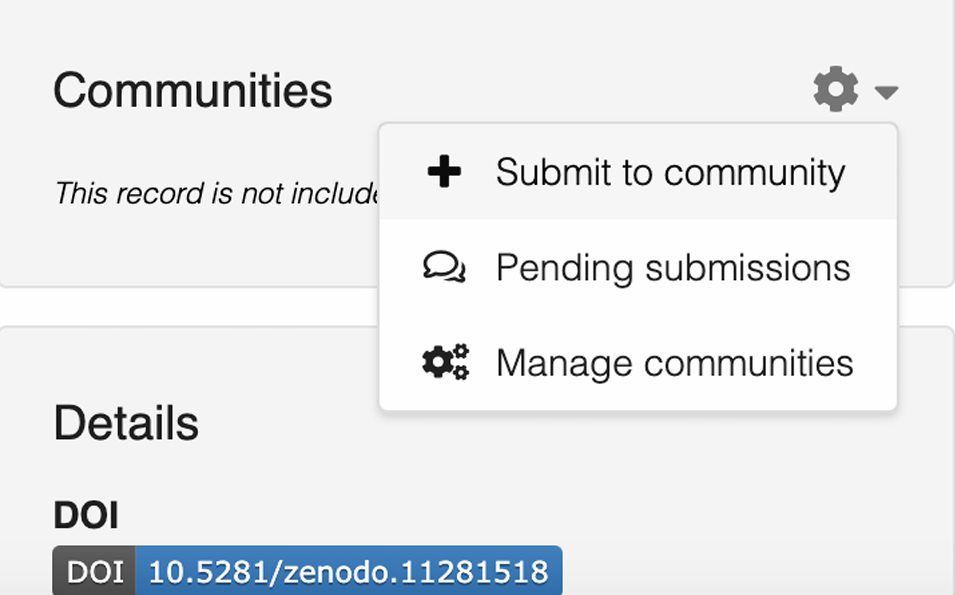
3) Select the “RE Open Data Initiative” by searching for it (note: you will not be an “Owner”)
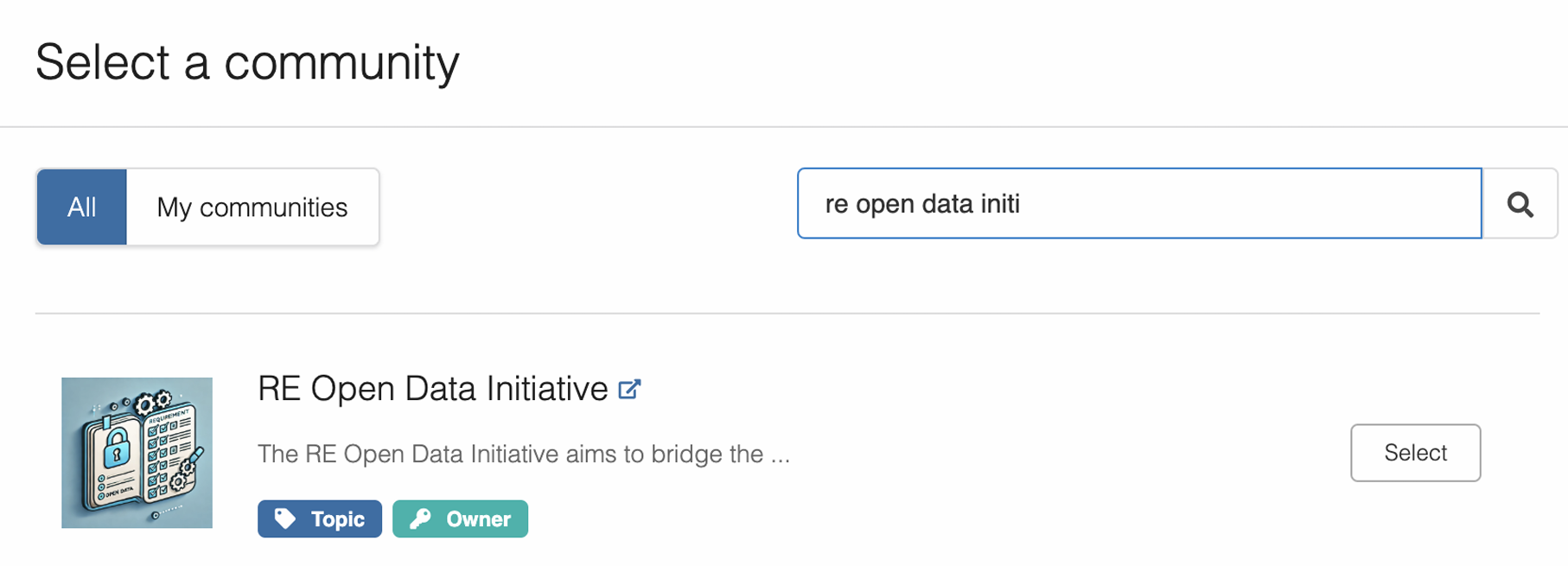
4) Agree with the conditions and add a message to the curators in which you briefly explain the relevance to the RE community.
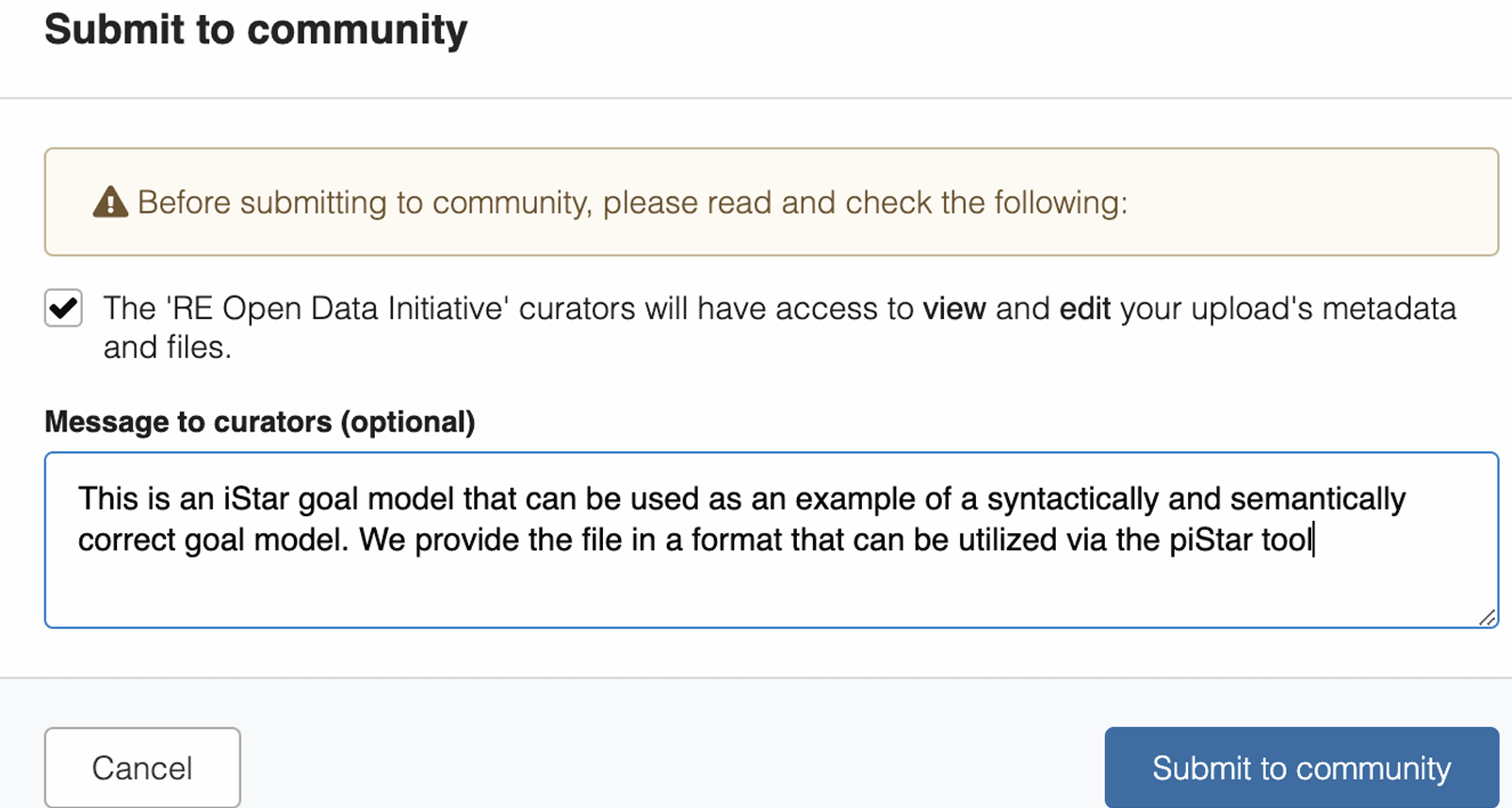
Scenario 3: Data set that has a DOI (not on Zenodo)
This scenario resembles Scenario 2, with the difference that the data is currently published elsewhere with a DOI.
In this case, you will have to create a new upload from your Zenodo account. Make sure you:
-
Choose the RE Open Data Initiative as the community you are submitting to
-
Make use of the DOI cross-referencing functionality of Zenodo. This means your Zenodo record will be created by
a) Uploading the same data you have stored in the existing DOI.
b) Do not register/reserve a new DOI, you simply copy the DOI you already have. When submitting, you will have to add the existing DOI (see picture below):
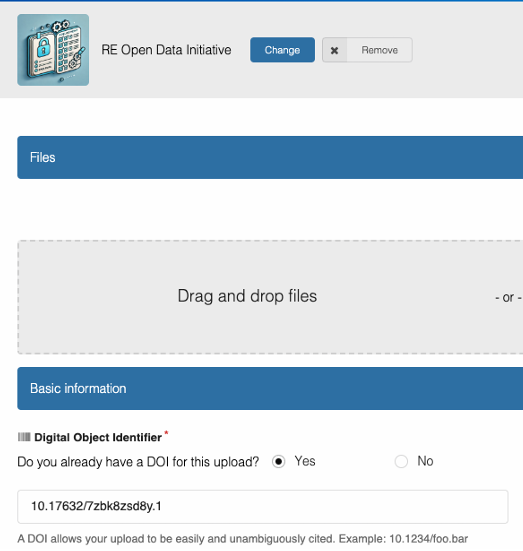
You will then press the option “Submit for review”, which will ask you to provide a message to the curators (the chairs of the initiative), similar to the last step of Scenario 2.
Scenario 4: Data set that is online but has no DOI
In this case, follow the instructions for Scenario 3, with the difference that you will request a new DOI rather than re-using an existing DOI. See screenshots below.
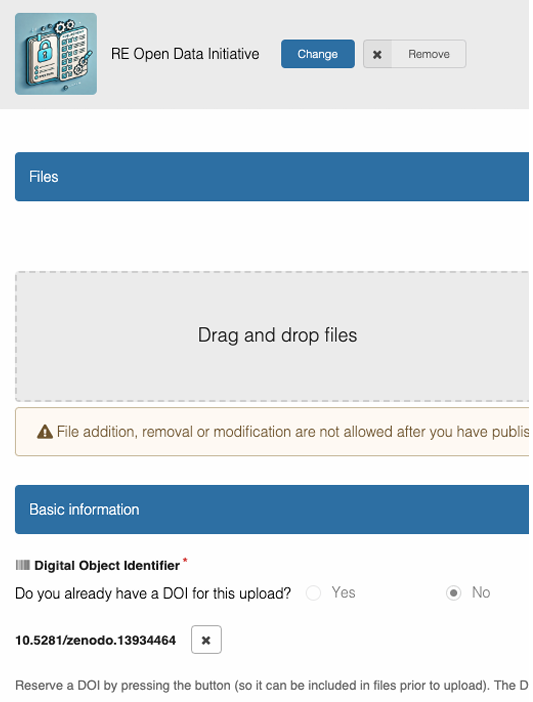
Available Datasets
Through a community effort, we offer a number of datasets that we invite researchers to use while writing their submissions to the RE conference. These datasets are stored in the RE Open Data Initiative alongside descriptive data that provides some context and, wherever applicable, links to the original documentation and source code.
The list of datasets will be continuously updated, but the following are the datasets we offer explicitly for the RE’25 conference:
-
Intralogistics requirements: requirements for a warehouse management system that have been assembled and combined from multiple projects (in order to remove confidential information).
-
Re-labeled PROMISE-NFR: a collection of functional and nonfunctional requirements from fifteen student projects, which have been re-labeled according to the DESIREE approach for modeling quality and nonfunctional requirements.
-
User stories: twenty-two sets of user stories, from various open projects, which have been collected from the web. The user stories include links to the original repositories and issue tracking systems, when available.
-
PURE requirements documents: seventy-nine natural language requirements documents collected from the web, provided both in PDF format and (for nineteen datasets) in XML according to a provided XSD schema.
-
Security requirements: three collections of requirements for three systems, labeled in terms of whether or not each requirement is a security one.
You can declare the use of one of these datasets while submitting a paper, by ticking the dedicated checkbox in EasyChair.